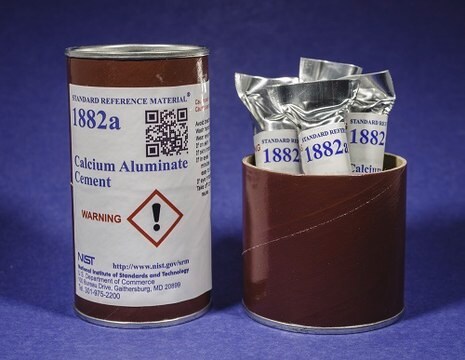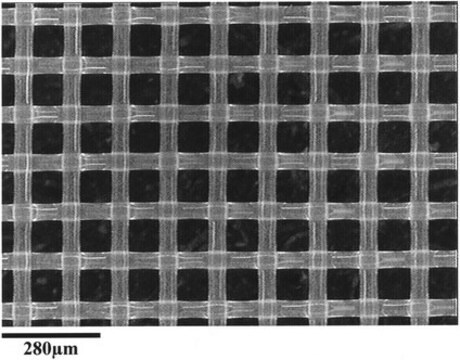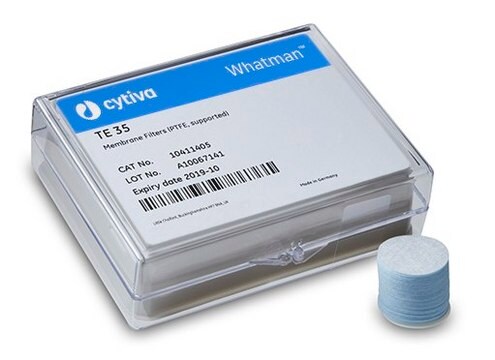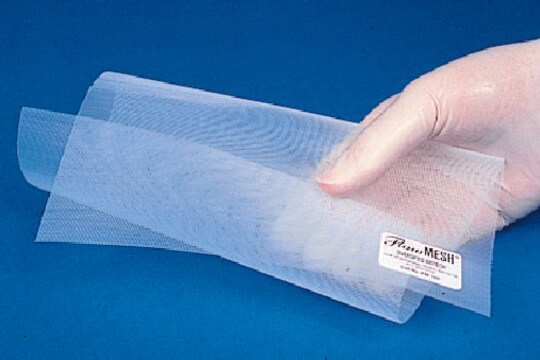NY8002500
Nylon Membrane Filter, 80.0 μm Pore Size
Millipore, filter diam. 25 mm, hydrophilic
Synonim(y):
Nylon Net Filter
Zaloguj sięWyświetlanie cen organizacyjnych i kontraktowych
About This Item
Kod UNSPSC:
40161507
eCl@ss:
32031602
NACRES:
NB.24
Polecane produkty
Materiały
Nylon membrane
plain filter
white filter
sterylność
non-sterile
Właściwości
hydrophilic
producent / nazwa handlowa
Millipore
Parametry
100 °C max. temp. (curling may be seen at temperatures above 75°C)
śr. filtra
25 mm
grubość
75 μm
wielkość porów
40 % porosity
80.0 μm pore size
Warunki transportu
ambient
Opis ogólny
Filter Code: NY80
Filter Type: Net filter
Nylon filters are compatible with a broad range of solvents. Two types are available: 1) Nylon Membrane Filters with pore sizes ranging from 0.20 to 1.2 µm, and 2) Woven Net Filters with mesh openings ranging from 5 to 180 µm.
Our 5 µm Nylon Woven Net Filter (NY054700) is commonly used in the automotive industry for cleanliness analysis.
Features & Benefits:
•Wide range of pore sizes available
•Resistant to aggressive solvents
Applications:
Particle Removal and Clarification; Solvent Filtration; Particle Analysis; Paint Monitoring; Automotive Cleanliness Analysis
Our 5 µm Nylon Woven Net Filter (NY054700) is commonly used in the automotive industry for cleanliness analysis.
Features & Benefits:
•Wide range of pore sizes available
•Resistant to aggressive solvents
Applications:
Particle Removal and Clarification; Solvent Filtration; Particle Analysis; Paint Monitoring; Automotive Cleanliness Analysis
Zastosowanie
- Collection of algae and cells
- Particle analysis
- Large particulate filtration
- Toxicology and drug screening on C. elegans and zebrafish
- Background filter for particle imaging systems
- Prefiltration of solvents
Paint monitoring
This page may contain text that has been machine translated.
Kod klasy składowania
10-13 - German Storage Class 10 to 13
Certyfikaty analizy (CoA)
Poszukaj Certyfikaty analizy (CoA), wpisując numer partii/serii produktów. Numery serii i partii można znaleźć na etykiecie produktu po słowach „seria” lub „partia”.
Masz już ten produkt?
Dokumenty związane z niedawno zakupionymi produktami zostały zamieszczone w Bibliotece dokumentów.
Raphael Hesse et al.
Acta neuropathologica communications, 7(1), 214-214 (2019-12-22)
Degeneration of synapses in Alzheimer's disease (AD) strongly correlates with cognitive decline, and synaptic pathology contributes to disease pathophysiology. We recently observed that the strongest genetic risk factor for sporadic AD, apolipoprotein E epsilon 4 (APOE4), is associated with exacerbated
Nasz zespół naukowców ma doświadczenie we wszystkich obszarach badań, w tym w naukach przyrodniczych, materiałoznawstwie, syntezie chemicznej, chromatografii, analityce i wielu innych dziedzinach.
Skontaktuj się z zespołem ds. pomocy technicznej






